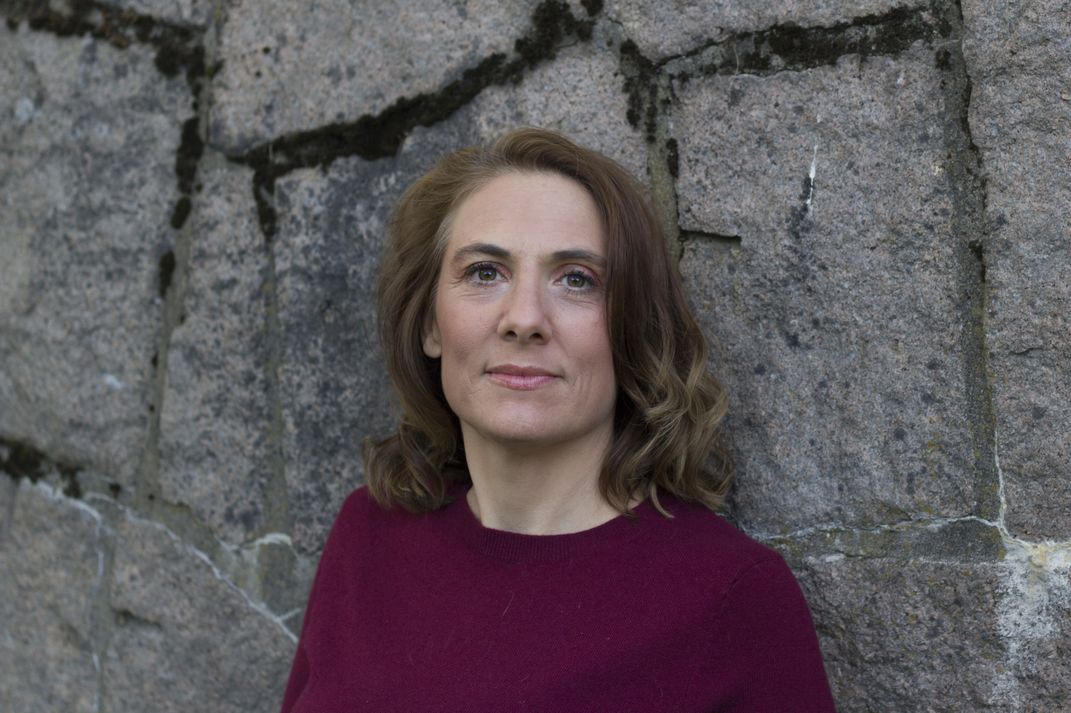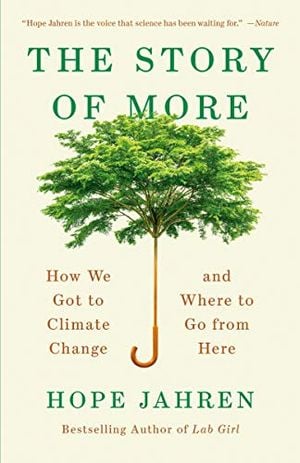Can We Really Combat Climate Change by Consuming Less? Maybe.
In her new book, scientist Hope Jahren talks about the warming planet and what can be done to slow its effects
/https://tf-cmsv2-smithsonianmag-media.s3.amazonaws.com/filer/fc/f3/fcf32c96-66ca-493e-a6cb-e40a1037b4b9/cargo_bike_commuting-main.jpg)
When Hope Jahren turned 50, she decided she needed real, data-driven answers about what had happened to the planet during her lifetime. She scoured national and international public data sets and reports from sources like the United Nations, the World Health Organization and the International Energy Agency. Jahren, known for her 2016 memoir, Lab Girl, then spent the next year analyzing mountains of information to find the numbers that demonstrated just how much the earth has changed since 1969. The result is her latest book, The Story of More, out March 3.
A professor at the Centre for Earth Evolution and Dynamics at the University of Oslo, Jahren chronicles the inventions that helped but also hurt us, as people and societies deal with the consequences of things like large-scale farming, electricity and an increasing global population. As humanity races to contain and respond to the widespread effects of climate change, we asked the geobiologist about the best ways to stop it, as well as whether gender diversity in STEM, a cause she advocates, has improved in recent years.
We've been talking about climate change and the repercussions of it for the past decade. Why is this book so important now?
The fact that you said ‘decade’ is really important, because it’s almost as if climate change is an invention of the last decade—or, at least, the practice of talking about it is. This is not something the news invented. This is something we did—all of us. It's also a predictable result of the last 50 years of our history. We built a world, and, in a lot of ways, we didn't know what we were building. And the side effect of building all these beautiful things is a set of problems.
I wanted to write something that didn't feed into this polarization which has really overtaken climate change rhetoric. Do you believe in it? Are you a denier? Are you a believer? Because [within such a rhetoric], believing is more important than actions, and that's truly something we're going to have to confront to get anywhere.
If you live in a trailer in a small community, and your air conditioning doesn't work, and you never get a day off because you use them up on your sick days to take care of your ailing mom, so you don't go anywhere on vacation, then you probably have a really small carbon footprint—and you probably resent very strongly people preaching. So, I think people that really want action on climate change are never going to get anywhere until we confront the rampant hypocrisy within that movement.

If we don't heed the wake-up call to do something, what do you anticipate? How do you foresee the next 10 years?
First of all, you shouldn't trust anyone who gives you a solid answer to those questions. The really important thing is that 10 percent of the world is causing 90 percent of the change. It's not about what somebody else is going to do; it's about what you're going to do. If you're part of the 10 percent, it's up to you.
What was your intent when writing this book?
Why did I write the book? Well, I turned 50 years old and I said, ‘I’m 50 years old and I want to study the world.’ What is my place in the world? What does my life mean? So, I thought I'm going to study what has happened to the world, how the world has changed since I was born in more concrete terms.
How long did it take you to go through the data and process it into what became The Story of More?
Whenever I was near a source, whenever I was walking by a library, whenever I met a farmer at a truck stop—whenever I got a chance to think about these things, I did. It made me into a more hopeful, positive person who had also taken a very careful look at the data. And it makes me hopeful and positive because this is not something we can’t wrap our heads around. That’s the first step.
Climate change solutions are really fun. Every idea is on the table and no matter how crazy it sounds. It’s like the most talented group of brainstormers on the side of the curious and daring and creative scientific fringe. I'm very hopeful because I live in a world where I'm surrounded by hardworking, informed people who care. And what problem can't you solve with that?
The Story of More: How We Got to Climate Change and Where to Go from Here
Hope Jahren is an award-winning scientist, a brilliant writer, a passionate teacher, and one of the seven billion people with whom we share this earth. In The Story of More, she illuminates the link between human habits and our imperiled planet. In concise, highly readable chapters, she takes us through the science behind the key inventions—from electric power to large-scale farming to automobiles—that, even as they help us, release greenhouse gases into the atmosphere like never before. She explains the current and projected consequences of global warming—from superstorms to rising sea levels—and the actions that we all can take to fight back.
You argue that we need to change our energy consumption levels and our fuel sources because the global population is growing. But what do we do first? Is it something that we start with at the individual level and then scale up?
The first thing is that people need to become aware of how much energy they’re using. People don’t have a good idea of all the different things in their lives that use energy and the relative amount of energy that they use.
There are some things that are non-negotiable. We need to sterilize instruments at the hospitals, light our way home from work. But what about the messy space in the middle? What can go? Are our electric toothbrushes really making us happier? Are golf carts really making the game more fun than when we walked with our clubs?
This is an election year. How would a change in our nation’s leadership affect interest in climate change within our nation?
Here’s the biggest and most passionate way I can speak directly to that: I’m very worried about the databases that I used to write this book. We need to have access to the numbers or we will be in the dark about what the earth is doing.
In my book, if you go into the resources chapter at the very end, there is an example of an EPA report that I kept using, “Climate Change Indicators in the United States.” Really good report, easy to read, beautiful graphics, for everybody. [The EPA] published it in 2010, 2012, 2014 and 2016. In 2018, it didn’t happen, and I can’t find any explanation as to why it didn’t happen. There are no plans as far as I can tell for it to happen in 2020.
This is the life's work of many, many people who faithfully did this for the good of their country. And it's all vulnerable. There are movements in Scandinavia and elsewhere to save and sequester these databases before they potentially disappear. Because data is more important than opinion. And it always will be.
All of these agencies serve at the pleasure of the administration and they are the agencies who tell us who we are, who tell us what we’re doing. There are a lot of scientists working for other scientists who have learned the ropes, who are educating young people coming up. They’re like trees: they’re a lot easier to cut down than they are to grow back.
You've always been vocal about women scientists, pushing their research and the importance of being visual in the field. What made you persist in science? There are so many women who get fed up and frustrated and leave.
Science is hard for women, but it's not like it's better anywhere else. There's no magical Disneyland where you can go and not encounter violence against women or problems associated with women's fertility, such as child leave.
I can't believe that I actually have the luxury of thinking for a living. I think of my grandmothers, and I come from a family that worked at a slaughterhouse. I think of the incredible privilege of being able to think for a living and how much joy I get out of looking at the numbers.
I'd like to think that just by the fact of being me, I bring a female perspective to [science]. Somehow that sounds fresh because there are so many forces to keep women invisible. I don't know. I don't think I've been particularly strategic or an agent for women in science. I think I've just refused to be invisible.
Have you seen any change in gender diversity within the STEM fields since Lab Girl came out in 2016?
Being a woman in science is funny, because for the first 10 years people really try to keep you out, and the next 10 years …well, people tried to draw me into all of these efforts to make girls into scientists. I was never really comfortable with that because I’m not aware of any programs to make boys into nurses. We don’t feel, for some reason, like we need to fix boys. Instead, I said to myself: ‘The biggest thing I have to contribute is an honest, unblemished, unvarnished story of what this life is like.’ How can you choose [science as] a career when nobody even tells you what you do every day?
The biggest change I’ve seen is that I’ve received a massive number of letters from students of all ages saying that they didn’t know plants were so cool and they want to go to school for plants or major in plants or they did major in plants. [Lab Girl] has been out long enough that people have gone to college to study plants and received plant degrees because they read my book, which is great.
Everyone’s picking the parts of your books they relate to.
Yes. And you can trust readers. They are just as smart as you are. You write a book about your life and people are going to judge you and ask, ‘Is this person really a good role model?’ And it’s been really gratifying to see that readers are smart and they were able to take what they wanted and walk by what they didn’t.
Is there anything else you’d like to add about the climate problem?
The kids are going to wake us up to the fact that this is serious and somebody should do something. And it’s us. We’re doing it.
The first step is to know yourself. How much Co2 did you make when you chose to drink orange juice versus a glass of water? Was it a little? Does it matter? If you’re going to do the one thing in your household that matters, how would you start? And it’s from planting that seed that I hope [people] will grow a cognizance about which parts of government are working towards or against it…because it’s not an all or one philosophy that’s going to make a difference. It’s an understanding, and understanding is not compatible with fear. One drives out the other.
A Note to our Readers
Smithsonian magazine participates in affiliate link advertising programs. If you purchase an item through these links, we receive a commission.
/https://tf-cmsv2-smithsonianmag-media.s3.amazonaws.com/accounts/headshot/Kristen_A._Schmitt.jpg)

/https://tf-cmsv2-smithsonianmag-media.s3.amazonaws.com/accounts/headshot/Kristen_A._Schmitt.jpg)